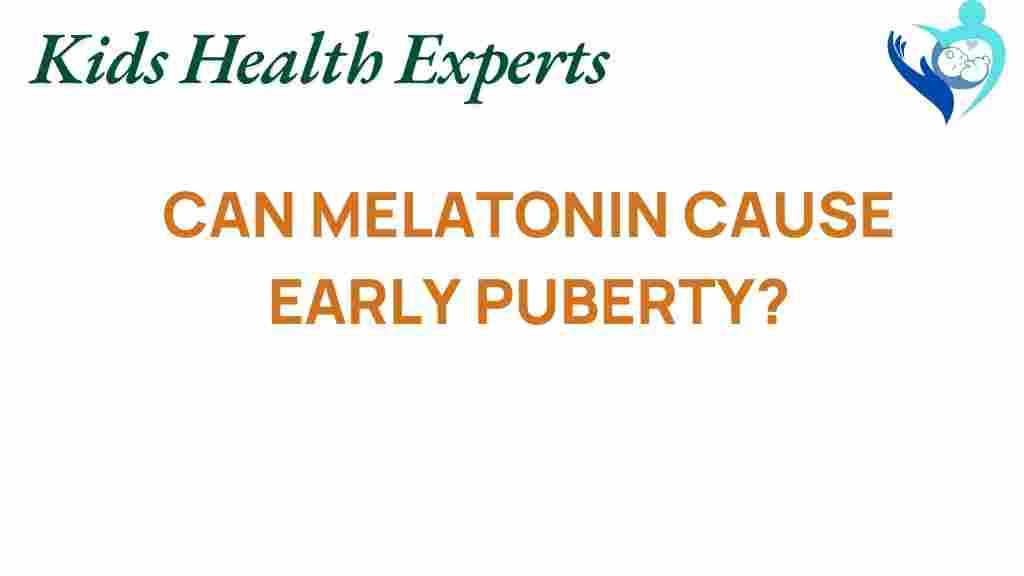Can Melatonin Really Trigger Early Puberty?
As parents and caregivers, we often seek ways to ensure our children develop healthily, including maintaining proper sleep hygiene. One supplement that has gained popularity for aiding sleep is melatonin. However, recent discussions have surfaced regarding the potential impact of melatonin on child development, particularly concerning early puberty. In this article, we will delve into the connection between melatonin, early puberty, and hormones, examining the implications for children’s health and development.
Understanding Melatonin
Melatonin is a hormone primarily produced by the pineal gland in the brain during the dark hours of the day. It plays a crucial role in regulating sleep-wake cycles, signaling the body when it is time to sleep. Children naturally produce melatonin, which helps them establish proper sleep patterns.
The Role of Hormones in Child Development
Child development is a complex process influenced by a variety of hormones. Hormones like estrogen and testosterone are critical for physical growth and the onset of puberty. Early puberty, defined as the onset of secondary sexual characteristics before age 9 in boys and age 8 in girls, can be influenced by several factors, including genetics, environmental factors, and hormonal imbalances.
Melatonin and the Endocrine System
The endocrine system regulates hormones in the body, and melatonin is one of the many hormones produced. There are emerging concerns regarding the interaction between melatonin supplementation and the endocrine system, particularly regarding its influence on the timing of puberty. Research suggests that melatonin may affect the secretion of other hormones, leading to potential changes in the timing of puberty onset.
Research on Melatonin and Early Puberty
Several studies have investigated the relationship between melatonin and early puberty. Here are some key findings:
- Melatonin’s Influence on Gonadotropin-Releasing Hormone (GnRH): Research indicates that melatonin might alter the release of GnRH, which plays a significant role in triggering the hormonal cascade that leads to puberty.
- Effects on Estrogen and Testosterone Levels: Some studies have shown that melatonin supplementation can influence levels of estrogen and testosterone, potentially leading to earlier development of secondary sexual characteristics.
- Environmental Factors: The modern lifestyle, including increased exposure to artificial light, can disrupt natural melatonin production, which might have implications for puberty timing.
Potential Health Implications of Early Puberty
Early puberty can have significant health implications for children, including:
- Psychosocial Effects: Children who undergo early puberty may face challenges such as bullying, body image issues, and emotional distress.
- Increased Risk of Health Issues: Early puberty has been linked to a higher risk of certain health conditions later in life, including obesity, diabetes, and breast or testicular cancer.
- Impact on Growth: Children who enter puberty early may experience growth spurts sooner but could ultimately be shorter in stature due to earlier closure of growth plates.
Step-by-Step: Understanding the Relationship Between Melatonin and Early Puberty
To unravel the mystery of whether melatonin could trigger early puberty, it’s essential to take a systematic approach:
1. Examine Sleep Patterns
Assess your child’s sleep habits. Are they getting enough sleep for their age? Insufficient sleep can lead to an imbalance in melatonin production and may influence hormonal health.
2. Review Melatonin Supplement Use
Consider why melatonin supplements are being used. Are they necessary for your child, or are there alternative strategies to improve sleep?
3. Monitor Developmental Milestones
Keep track of your child’s physical and emotional development. If you notice signs of early puberty, consult a healthcare professional to discuss potential causes.
4. Consult Healthcare Providers
If you have concerns about melatonin use or early puberty, it is crucial to speak with a pediatrician or an endocrinologist who can provide guidance based on current research and individual health needs.
Troubleshooting Tips for Parents
If you are concerned about your child’s sleep and the potential effects of melatonin on their development, consider the following tips:
- Establish a Consistent Sleep Routine: Encourage a regular bedtime and wake-up time to promote natural melatonin production.
- Limit Screen Time: Reduce exposure to screens at least one hour before bedtime to support healthy sleep patterns.
- Explore Natural Sleep Aids: Consider alternative methods, such as herbal teas or relaxation techniques, to promote better sleep without supplementation.
- Educate Yourself: Stay informed about the latest research regarding melatonin and child development. Resources such as the National Sleep Foundation can provide valuable insights.
Conclusion
In conclusion, while melatonin is a beneficial hormone that aids in sleep regulation, its role in early puberty remains a subject of ongoing research. The delicate interplay between melatonin, hormones, and the endocrine system highlights the importance of understanding how supplements can affect child development.
Parents should approach melatonin supplementation with caution and consider consulting healthcare professionals to ensure their child’s health is not compromised. By prioritizing healthy sleep habits and staying informed, parents can help support their child’s overall well-being during critical developmental stages.
As research continues to evolve, it is crucial to stay updated on the health implications of melatonin and early puberty to make informed decisions for your child’s health. For more detailed information on child development and hormonal health, consider exploring resources from reputable organizations and professionals in the field.
This article is in the category Conditions and created by KidsHealthExperts Team

1 thought on “Can Melatonin Really Trigger Early Puberty? Unraveling the Mystery”